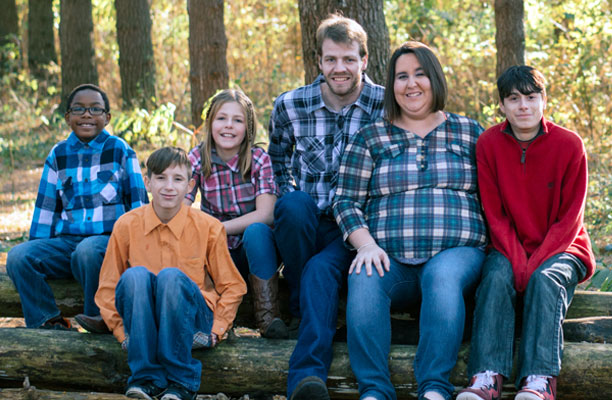
Brittany and her husband, Daniel, came to foster care the way that many families do. They were unable to conceive a child by birth—or so they thought at the time. They shared custody of Daniel’s child from a previous marriage, but they wanted to have children together. They tried fertility treatments, but gave up after several rounds.
“It was heartbreaking. I had to stop,” she said.
A friend who was a foster parent suggested that Brittany consider it. At the time, Brittany was volunteering with her local CASA program, advocating for children in foster care, so she knew some of what was involved in being a foster parent.
She and Daniel decided to contact a local agency.
From one to six
In 2013, Brittany and Daniel got licensed to foster and adopt. They fostered five children—all of whom returned to their birth families—before adopting their first child together, a son, in 2016.
“He was nine years old and had spent his whole life in foster care. During that time, he lived in several placements. It took him a while to believe that he really wasn’t going anywhere—and about two years before he would call me Mom. That was a long wait, but it was worth it,” Brittany said.
While Brittany and Daniel were in the process of adopting their son and continuing to foster, they were contacted by a worker who saw their profile on adoptuskids.org and correctly believed that they would be a good match for two brothers on her caseload. They were in the process of adopting the boys when Brittany found out that she was pregnant with a daughter.
They adopted one more teen from foster care this spring. And today, Brittany and Daniel are the proud parents of six children, who range in age from 1 to 16.
“I definitely don’t sleep!”
Brittany says her family’s life is structured—yet chaotic. And she wouldn’t have it any other way.
“We have a good routine that the kids are accustomed to. They know what to expect—and what is expected of them. It is good for everyone. Of course, if one thing falls apart—everything falls apart!”
What she lacks in sleep, Brittany says, she make up for in the reward of knowing that their children are safe—and in hugs.
“The older boys are teenagers. They don’t even want to be looked at or touched! So when they come up and give me a hug, it means a lot,” Brittany said.
“My reason for being here is these kids.”
When Brittany and Daniel started fostering, she was working as a paralegal. Last year, she left that job to follow her calling and become a foster parent recruiter with a local agency. The program she leads today is focused on recruiting therapeutic foster parents for children in residential treatment facilities.
“Recruiting good foster parents is the most rewarding job I’ve ever had. It might also be the most difficult.”
In talking with families, Brittany says she is constantly confronting myths and stigmas—people who say they are not sure that they can handle the children’s behaviors, or fear that they will get attached, or anticipate a lack of support.
As a foster parent, Brittany says she experienced some of those issues. As a recruiter, she is helping to address them. The program she leads, a foster care treatment model in Oregon, provides therapeutic foster care training and enhanced support to foster families bringing children from residential treatment facilities into their homes. An important part of her work is calling parents daily and facilitating weekly support group meetings.
“I believe that we are all here for a reason. Mine is to help kids in care. As a volunteer, as a parent, now as my career, foster care is literally my life. Whether it is taking kids in or adopting them myself, or finding them another good home to go into. Helping these kids is all I want to do.”
Think foster parenting might be right for you? Learn more about the types of fostering and what it takes to be a successful parent.